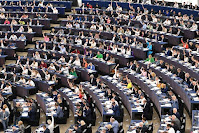Assessment of environmental and climate results of the European Parliament: 2019-2024
The European Parliament (EP) plays a crucial role in shaping environmental and climate policy in the European Union (EU). As directly elected representatives of EU citizens, the EP has the power to scrutinize and approve EU legislation, pass non-binding resolutions and hold the European Commission accountable for its actions.
This blog post assesses the European Parliament's Environment and Climate Report 2019-2024, looking at its key achievements and shortcomings. The assessment is based on the findings of leading environmental and climate organizations, including the European Environmental Bureau , Greenpeace and Climate Action Tracker.
Achievement
In recent years, the EP has demonstrated a strong commitment to environmental protection and climate action. Notable achievements include:
European Green Deal: The EU played a key role in shaping the European Green Deal, the EU's ambitious plan to achieve climate neutrality by 2050. The EP called for even more ambitious targets and insisted on faster implementation of Green Deal measures.
European Climate Law: The EU played an important role in the adoption of the European Climate Law, which enshrines the EU's goal of climate neutrality in law and sets binding targets for reducing greenhouse gas emissions.
Farm-to-Fork Strategy: The EP strongly supported the EU's Farm-to-Fork Strategy, which aims to make the EU food system more sustainable and fair. The EP is calling for more ambitious targets to reduce pesticide use and increase organic farming.
EU Taxonomy for Sustainable Activities: The EU played a key role in the development of the EU Taxonomy for Sustainable Activities, a classification system for environmental investments. The EP insisted on a more reliable and science-based taxonomy to ensure that only truly sustainable investments are labeled as green.
Disadvantages
Despite its achievements, the EP is also criticized for failings on environmental and climate issues. Key areas for improvement include:
Ambitious targets: Some environmental and climate organizations argue that the EU is not ambitious enough in setting emission reduction targets and other environmental goals. They call on the EP to adopt more ambitious targets in line with the latest scientific advice.
Enforcement: The EU has been criticized for its lack of oversight to ensure proper enforcement of EU environmental and climate legislation. Some argue that the EU needs to do more to hold the European Commission and member states accountable for upholding EU law.
Loopholes and exemptions: Critics point to loopholes and exemptions in EU environmental and climate legislation that allow environmental damage to continue. They call on the EP to close these loopholes and ensure the full effectiveness of EU legislation.
Influence of industry lobbyists: The EP has been accused of being too susceptible to lobbying by industry groups interested in weakening environmental and climate policy. Critics call for greater transparency and accountability in the EP's interactions with lobbyists.
Conclusion
In recent years, the European Parliament has made significant progress on environmental and climate issues. However, much remains to be done to address the pressing environmental and climate challenges facing the EU. The EP must continue to play a leading role in promoting more ambitious targets, stricter enforcement and the removal of loopholes and exemptions. In this way, the EP can help ensure a more sustainable and climate-resilient future for the EU.




Comments
Post a Comment